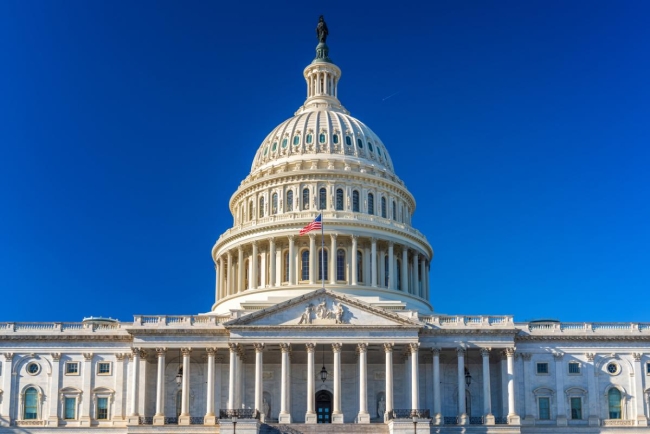You have /5 articles left.
Sign up for a free account or log in.

Congress is considering more relief for student loan borrowers.
Istockphoto.com/sborisov
A $1.6 trillion stimulus proposal from Republicans to help the economy during the coronavirus crisis stalled in the Senate over a number of objections by Democrats, including that the proposal didn’t do enough to help those saddled with student debt.
The bill was hindered as well by five Republican senators putting themselves in self-quarantine, including Kentucky’s Rand Paul, who announced Sunday he has tested positive for the virus. A procedural vote only to move forward with debate fell far short of the needed 60 votes, 47 to 47.
Democrats had raised a number of objections to the Republican plan, from the amount of funding to businesses to a lack of help for hospitals and states. But a Democratic aide emailed that among them is concern a six-month moratorium on borrowers repaying student loans wouldn’t provide enough relief.
While negotiations were continuing as of press time, associations representing colleges and universities were also distressed that the Republican proposal to provide $6 billion, spread out among all public and private universities and for emergency grants to students, as well as an additional $1.3 billion for research institutions, is far from enough.
“While we are grateful that the bill acknowledges the financial crisis facing colleges and universities, the amount falls so far below what is needed that it is likely to lead to immediate layoffs, deep budget cuts, and quite likely, institutional closures,” said Terry Hartle, the American Council on Education’s senior vice president for government relations and public affairs.
College and university presidents and chancellors have been urgently calling members of Congress, seeking help as they struggle with the financial fallout of campus closures, shifting to online classes and other ramifications of the crisis.
The Republican plan would excuse borrowers from making loan payments for six months, without interest accruing, Republican Senator Lamar Alexander, chairman of the Senate’s education committee, said on the Senate floor Sunday.
That would mean longer relief than the 60-day deferment U.S. Education Secretary Betsy DeVos announced Friday.
Senate Democrats, though, not only wanted to excuse borrowers who might be struggling from job losses or cuts in pay from having to make the payments. They want the federal government to make the payments for them so that their balance would be reduced by at least $10,000.
As of Sunday evening, the Republican proposal on student debt, according to a copy of the plan reported on by Politico, also would count the time when payments are not required to be made toward loan forgiveness programs, as if the borrower had been making payments. Ben Miller, the progressive Center for American Progress’s senior director for postsecondary education, said the bill doesn’t apply to commercially held Federal Family Education and Perkins Loans.
Senator Patty Murray, the top Democrat on the education committee, said in a release that she planned to oppose the bill over a number of concerns including provisions affecting students.
“In the midst of an unprecedented national crisis, Republicans can’t seriously expect us to tell people in our communities who are suffering that we shortchanged hospitals, students, workers and small businesses but gave big corporations hundreds of billions of dollars in a secretive slush fund,” Murray said
The initial Republican proposal was also facing opposition in the Democratic House, which is said to be preparing its own proposal for when the Senate bill is sent to them.
“The proposal that Senate Republicans revealed this morning would not provide students, workers, and families the urgent relief they need,” said House education committee chairman Bobby Scott in a statement.
Politico reported that Democratic House Speaker Nancy Pelosi made a number of demands during a meeting Sunday with congressional leaders and Treasury Secretary Steven Mnuchin, including wiping off $10,000 from anyone who owns federal student loans.
Sunday night, Democratic presidential candidate Joe Biden also backed the idea of forgiving $10,000 of all federal student loans. "Young people and other student debt holders bore the brunt of the last crisis. It shouldn't happen again," he said on Twitter.
Advocacy groups that have been pushing for more student borrower relief also attacked the Republican proposal on Sunday.
The proposal “offers only minor tweaks for some federal student loan borrowers … The economic dam is about to burst and [Senate Majority Leader Mitch] McConnell is offering student loan borrowers nothing but a deflated, leaky life vest,” Alexis Goldstein, senior policy analyst for the progressive Americans for Financial Reform, said in a statement.
Meanwhile, according to a Senate appropriations committee document, the bill would provide $6 billion in federal funds to higher education institutions “to both directly support students facing urgent needs related to coronavirus, and to support institutions as they cope with the immediate effects of coronavirus and school closures.” That would include targeted money for institutions “with the greatest need and minority serving institutions, including HBCUs,” the document said.
The funding would help, said Craig Lindwarm, the Association of Public and Land-grant Universities’ vice president for governmental affairs, but it is “wholly inadequate to meet the incredible challenges we face.”
Matt Owens, the Association of American Universities’ executive vice president and vice president for federal relations, agreed, saying, “it falls short of meeting the needs caused by the pandemic,” and he hoped the House will add more.
The additional $1.3 billion proposal for research institutions is also only a fraction of the $13 billion APLU asked for, said Deborah Altenburg, APLU’s assistant vice president for research advocacy and policy. The $13 billion was estimated to be the amount needed to keep paying graduate and postdoctoral students if labs need to be closed, she said, as well as the cost of shutting them down, maintaining them and then reopening them.




